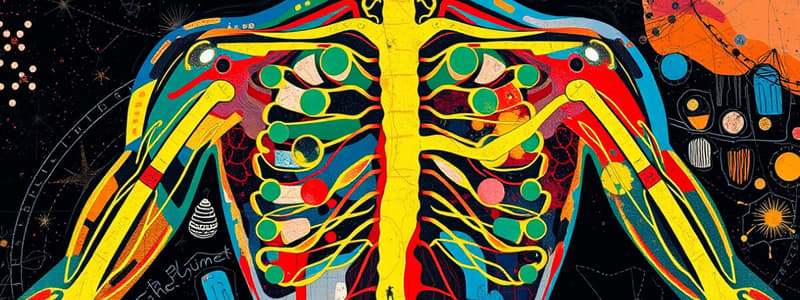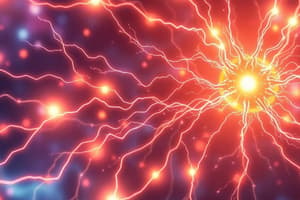Podcast
Questions and Answers
Which of the following functions is NOT associated with the nervous system?
Which of the following functions is NOT associated with the nervous system?
- Cognition and problem solving
- Regulation of body temperature
- Emotion and emotional expression
- Digestion of food (correct)
Interneurons are the least numerous type of nerve cell in the nervous system.
Interneurons are the least numerous type of nerve cell in the nervous system.
False (B)
What are the two main types of neurons in the nervous system?
What are the two main types of neurons in the nervous system?
Afferent (sensory) neurons and efferent (motor) neurons
Afferent neurons transmit information toward the ______ and originate from sensory ______.
Afferent neurons transmit information toward the ______ and originate from sensory ______.
What is one of the primary roles of motor neurons?
What is one of the primary roles of motor neurons?
The nervous system is responsible for both voluntary and involuntary responses.
The nervous system is responsible for both voluntary and involuntary responses.
Match the type of neuron with its function:
Match the type of neuron with its function:
What is the approximate number of cells in the human nervous system?
What is the approximate number of cells in the human nervous system?
What reaction is primarily associated with the sympathetic nervous system?
What reaction is primarily associated with the sympathetic nervous system?
The sympathetic nervous system decreases heart rate during stress.
The sympathetic nervous system decreases heart rate during stress.
What neurotransmitter is primarily released by most postganglionic neurons in the sympathetic nervous system?
What neurotransmitter is primarily released by most postganglionic neurons in the sympathetic nervous system?
During the knee-jerk reflex, the sensory neuron connects to a _________ in the spinal cord.
During the knee-jerk reflex, the sensory neuron connects to a _________ in the spinal cord.
Which of the following is NOT a function of the sympathetic nervous system?
Which of the following is NOT a function of the sympathetic nervous system?
A monosynaptic reflex arc involves more than one synapse.
A monosynaptic reflex arc involves more than one synapse.
Name an example of a polysynaptic reflex arc.
Name an example of a polysynaptic reflex arc.
The _________ nervous system is responsible for the body’s rest-and-digest functions.
The _________ nervous system is responsible for the body’s rest-and-digest functions.
Match the following terms with their descriptions:
Match the following terms with their descriptions:
What physiological changes occur when the sympathetic nervous system is activated?
What physiological changes occur when the sympathetic nervous system is activated?
What part of the nervous system is responsible for basic life functions such as breathing?
What part of the nervous system is responsible for basic life functions such as breathing?
The white matter in the brain consists of unmyelinated cell bodies and dendrites.
The white matter in the brain consists of unmyelinated cell bodies and dendrites.
What are the two primary components of the nervous system?
What are the two primary components of the nervous system?
The first neuron in the autonomic nervous system is called the ________ neuron.
The first neuron in the autonomic nervous system is called the ________ neuron.
Which neurotransmitter is primarily responsible for parasympathetic responses in the body?
Which neurotransmitter is primarily responsible for parasympathetic responses in the body?
The sympathetic nervous system promotes digestion.
The sympathetic nervous system promotes digestion.
Name the two subdivisions of the autonomic nervous system.
Name the two subdivisions of the autonomic nervous system.
The spinal cord is protected by the ________ column.
The spinal cord is protected by the ________ column.
Which of the following statements best describes the function of the dorsal root ganglia?
Which of the following statements best describes the function of the dorsal root ganglia?
Match the division of the nervous system with its function:
Match the division of the nervous system with its function:
The spinal cord consists of grey matter on the outside and white matter on the inside.
The spinal cord consists of grey matter on the outside and white matter on the inside.
What is the primary role of the parasympathetic nervous system?
What is the primary role of the parasympathetic nervous system?
The motor neurons exit the spinal cord _________ (closest to the front of the body) side.
The motor neurons exit the spinal cord _________ (closest to the front of the body) side.
Which statement is true regarding the sensory neurons in the spinal cord?
Which statement is true regarding the sensory neurons in the spinal cord?
What are the three functions managed by the autonomic nervous system?
What are the three functions managed by the autonomic nervous system?
Flashcards are hidden until you start studying
Study Notes
Functions of the Nervous System
- Governs involuntary and voluntary behaviors, maintaining homeostasis.
- Major functions include sensation, perception, motor function, cognition, memory, emotion, balance, coordination, and regulation of various body systems.
- Regulates endocrine glands, heart rate, breathing rate, and temperature.
Nervous System Overview
- Comprises over 100 billion cells that communicate and coordinate signals throughout the body.
- Action is triggered by external stimuli processed by the nervous system.
Central and Peripheral Nervous Systems
- Divided into the central nervous system (CNS) and peripheral nervous system (PNS).
- CNS includes the brain and spinal cord; brain contains white matter (myelinated axons) and grey matter (unmyelinated cell bodies).
- PNS consists of nerve tissue outside the CNS, including all spinal and most cranial nerves.
Nerve Cell Types
- Three main types of neurons: sensory (afferent), motor (efferent), and interneurons.
- Sensory neurons transmit information from sensory receptors to the CNS; motor neurons carry signals from the CNS to muscles and glands; interneurons connect sensory and motor neurons, largely located in the CNS.
Processing of Stimuli
- Reflex responses may occur at the spinal cord level without brain involvement (e.g., knee-jerk reflex).
- More complex responses require input from the brain or brainstem.
Spinal Cord Structure
- Comprised of white and grey matter, with white matter on the outside and grey matter inside.
- Sensory neurons enter the spinal cord at the dorsal side; motor neurons exit at the ventral side.
- Spinal cord is divided into four regions: cervical, thoracic, lumbar, and sacral.
Peripheral Nervous System Subdivisions
- Somatic nervous system connects CNS to skin, joints, and muscles, managing voluntary functions.
- Autonomic nervous system (ANS) regulates involuntary functions such as heart rate, respiration, and digestion.
Autonomic Nervous System (ANS)
- Divided into sympathetic and parasympathetic systems, which typically have opposing functions.
- Sympathetic nervous system prepares the body for "fight-or-flight" situations, increasing heart rate and blood glucose.
- Parasympathetic nervous system conserves energy, promoting "rest-and-digest" functions like digestion and reduced heart rate.
Reflex Arcs
- Reflex arcs control reflexive behavior using sensory input and motor output to create quick responses.
- Two types of reflex arcs: monosynaptic (single synapse between sensory and motor neurons) and polysynaptic (involving one or more interneurons).
- Example of monosynaptic reflex: knee-jerk reflex, where stretching the patellar tendon causes immediate leg extension.
- Example of polysynaptic reflex: withdrawal reflex when stepping on a nail, involving interconnections for balance maintenance.
Key Concepts
- Preganglionic neurons (first neuron in ANS) reside in the CNS; postganglionic neurons synapse in the PNS.
- Acetylcholine is the primary neurotransmitter for the parasympathetic system; norepinephrine is typically released by sympathetic postganglionic neurons.
Studying That Suits You
Use AI to generate personalized quizzes and flashcards to suit your learning preferences.




